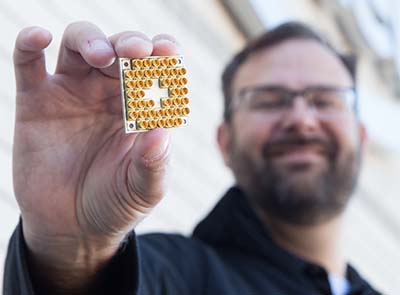Intel has delivered a 17-qubit superconducting test chip for quantum computing to QuTech, its quantum research partner in the Netherlands.
The new chip was fabricated by Intel and features a unique design to achieve improved yield and performance.
The delivery of the chip demonstrates the fast progress Intel and QuTech are making in researching and developing a working quantum computing system. It also underscores the importance of material science and semiconductor manufacturing in realizing the promise of quantum computing.
Quantum computing is the ultimate in parallel computing, with the potential to tackle problems conventional computers can’t handle. For example, quantum computers may simulate nature to advance research in chemistry, materials science and molecular modelling – like helping to create a new catalyst to sequester carbon dioxide, or create a room temperature superconductor or discover new drugs.
However, despite much experimental progress and speculation, there are inherent challenges to building viable, large-scale quantum systems that produce accurate outputs. Making qubits (the building blocks of quantum computing) uniform and stable is one such obstacle.
Qubits are tremendously fragile: any noise or unintended observation of them can cause data loss. This fragility requires them to operate at about 20 millikelvin – 250 times colder than deep space. This extreme operating environment makes the packaging of qubits key to their performance and function.
Intel’s components research group (CR) in Oregon and assembly test and technology development (ATTD) teams in Arizona are pushing the limits of chip design and packaging technology to address quantum computing’s unique challenges.
The new 17-qubit test chip’s improved design features include:
* New architecture allowing improved reliability, thermal performance and reduced radio frequency (RF) interference between qubits.
* A scalable interconnect scheme that allows for 10-times to 100-times more signals into and out of the chip as compared to wirebonded chips.
* Advanced processes, materials and designs that enable Intel’s packaging to scale for quantum integrated circuits, which are much larger than conventional silicon chips.
“Our quantum research has progressed to the point where our partner QuTech is simulating quantum algorithm workloads, and Intel is fabricating new qubit test chips on a regular basis in our leading-edge manufacturing facilities,” says Dr Michael Mayberry, corporate vice-president and MD of Intel Labs. “Intel’s expertise in fabrication, control electronics and architecture sets us apart and will serve us well as we venture into new computing paradigms, from neuromorphic to quantum computing.”
Intel’s collaborative relationship with QuTech to accelerate advancements in quantum computing began in 2015. Since that time, the collaboration has achieved many milestones – from demonstrating key circuit blocks for an integrated cryogenic-CMOS control system to developing a spin qubit fabrication flow on Intel’s 300mm process technology and developing this unique packaging solution for superconducting qubits.
Through the partnership, the time from design and fabrication to test has been greatly accelerated.
“With this test chip, we’ll focus on connecting, controlling and measuring multiple, entangled qubits towards an error correction scheme and a logical qubit,” says professor Leo DiCarlo of QuTech. “This work will allow us to uncover new insights in quantum computing that will shape the next stage of development.”
The collaboration between Intel and QuTech’s spans the entire quantum system – or “stack” – from qubit devices to the hardware and software architecture required to control these devices as well as quantum applications. All of these elements are essential to advancing quantum computing from research to reality.
Intel is also investigating multiple qubit types. These include the superconducting qubits incorporated into this newest test chip, and an alternative type called spin qubits in silicon. These spin qubits resemble a single electron transistor similar in many ways to conventional transistors and potentially able to be manufactured with comparable processes.
Pictured: Intel’s director of quantum hardware, Jim Clarke, holds the new 17-qubit superconducting test chip
Credit: Intel Corporation

